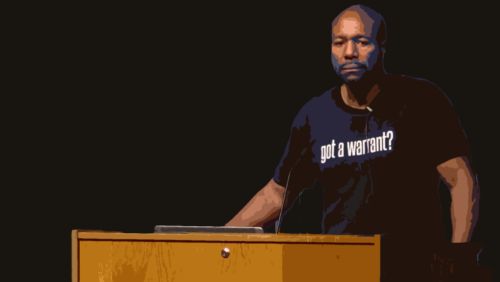Professor Paul Butler Premieres Video: “Ten Commandments for Black Men”
January 18, 2019

An image of Professor Paul Butler from his video "Ten Commandments for Black Men," shown for the first time at Georgetown Law on January 17.
Almost half of all African American men have been arrested by age 23. One in three have a felony conviction. More than 500,000 are currently incarcerated. Professor Paul Butler knows this, because as a former federal prosecutor, it was his job to lock up black men. But Butler, a black man, is well aware that his own resume (which also includes Georgetown Law professor and a J.D. from Harvard) hasn’t insulated him from police bias.
“I’ve been stopped and frisked more times than I can count, thrown against a cop car twice, and worst of all, I was arrested and prosecuted for a crime I didn’t commit,” Butler says in “10 Commandments for Black Men,” a newly released video shown at Georgetown Law on January 17.
Butler — who was arrested while serving as a prosecutor at the Department of Justice, after a neighbor falsely claimed he pushed her in a dispute over a parking space — beat the case, he said, because he knew how to work the system. Now, he’s sharing advice with others who may find themselves in similar situations.
Although the law requires reasonable suspicion before police may “stop and frisk,” police can start with just about anything as a pretext: A black man driving a black SUV. Three or more black men in a car. A black man running. A black man wearing a Black Lives Matter t-shirt.
Invoke your right to silence and your right to a lawyer, Butler counsels. A free public defender, he said, might have far more experience than a paid lawyer — or not. A good lawyer will ask the prosecutor for discovery and Brady (requiring the prosecution to turn over exculpatory evidence). “If your lawyer says, ‘what’s that?’” Butler says, “run for the hills.”
Making Things Better
The video, based on a chapter of Butler’s 2017 book Chokehold: Policing Black Men (The New Press), was shown to students during a lunchtime discussion with Butler, Distinguished Visitor from Practice Christy Lopez and Professor from Practice Vida Johnson.
“I saw in this video a lot of what I saw in Professor Butler’s book, which is a fantastic book, and we assign it in the practicum [Professor Rosa Brooks and I] teach here on policing,” says Lopez, who has worked on constitutional policing issues for decades and led the Department of Justice team investigating the Ferguson police department after the death of Michael Brown.
Lopez, Butler and Brooks were part of the Georgetown Law team developing the curriculum for the Police for Tomorrow fellowship program — in which Georgetown Law professors and students in the practicum explore some of the most contentious issues in policing to recruits at D.C.’s Metropolitan Police Academy.
“There’s plenty of work we can and should be doing to dismantle the systems [of bias] so that this video becomes obsolete…” Lopez said. “I encourage everyone to take the information in this video and use that to devise a plan to make things better, not only in the here and now, but in the long run.”
Performance?
Student responses were generally positive. “This is ‘the Talk 2.0,’” said one, who grew up being counseled by elder family members on the subject. Nevertheless, students questioned whether defendants should have to “perform” by acting subservient to police or by dressing a certain way in court. Professors agreed that while those discussions are “absolutely right as a matter of free expression,” defendants should be aware of the realities, to avoid extra attention from police and to keep themselves safe.
Professor from Practice Vida Johnson, a former public defender who works in Georgetown Law’s Criminal Defense and Prisoner Advocacy Clinic with Professor Abbe Smith, called the video “incredibly useful” for judges and prosecutors as well as for criminal defendants. “It shows that our system is so deeply flawed…how the people upon whom the pain of this system is visited the harshest is black men — that’s absolutely true in D.C., where 95 percent of the criminal defendants are black in a city that’s less than 50 percent African American.”
“I’d love to see this video in churches and in schools, high schools — as demoralizing as it is, in D.C., it’s a reality…” Johnson said. “If you guys want to do this work, give people this kind of advice, come join the [three] criminal defense clinics here at Georgetown.”
The event was cosponsored by Georgetown Law’s Black Law Students Association, Criminal Law Association and Georgetown Defenders.
https://www.facebook.com/georgetownlaw/videos/354719898696890/